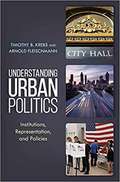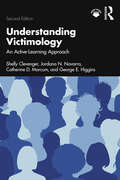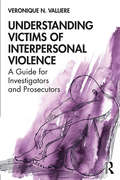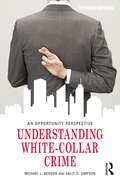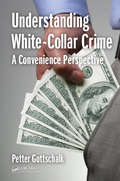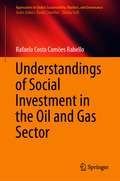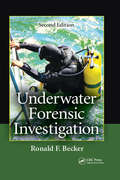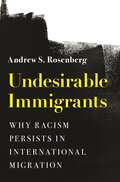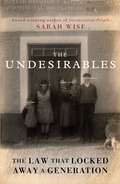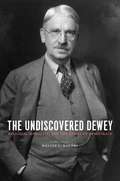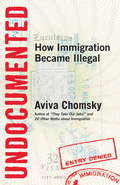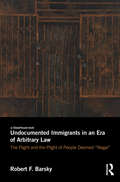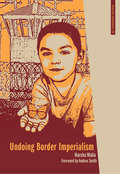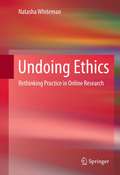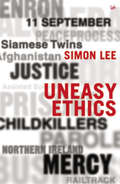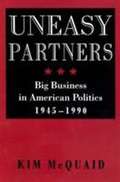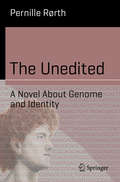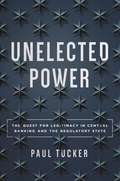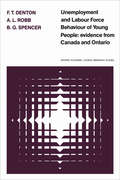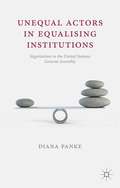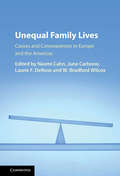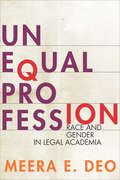- Table View
- List View
Understanding Transitional Justice
by Giada GirelliThe book is an accurate and accessible introduction to the complex and dynamic field of transitional and post-conflict justice, providing an overview of its recurring concepts and debated issues. Particular attention is reserved to how these concepts and issues have been addressed, both theoretically and literally, by lawyers, policy-makers, international bodies, and other actors informing the practice. By presenting significant, if undeniably disputable, alternatives to mainstream theories and past methods of addressing past injustice and (re)building a democratic state, the work aims to illustrate some foundational themes of transitional justice that have emerged from a diverse set of discussions. The author's position thus arrives from a careful analysis of the advantages and disadvantages of answers to the question: how, after a traumatic social experience, is justice restored?
Understanding Urban Politics: Institutions, Participation, and Policies
by Timothy B. Krebs Arnold FleischmannIn Understanding Urban Politics: Institutions, Representation, and Policies, Timothy B. Krebs and Arnold Fleischmann introduce a framework that focuses on the role of institutions in establishing the political “rules of the game,” the representativeness of city government, the influence of participation in local democracy, and how each of these features influences the adoption and implementation of public policies. Part 1 lays the groundwork for the rest of the book by exploring the many meanings of “urban,” analyzing what local governments do, and providing a history of American urban development. <p><p> Part 2 examines the organizations and procedures that are central to urban politics and policy making: intergovernmental relations, local legislatures, and the local executive branch. Part 3 looks at elections and voting, local campaigns, and non-voting forms of participation. The four chapters in Part 4 focus on the policy process and the delivery of local services, local government finances, “Building the City” (economic development, land use, and housing), and policies affecting the quality of life (public safety, the environment, “morality” issues, and urban amenities).
Understanding Victimology: An Active-Learning Approach
by Shelly Clevenger Jordana N. Navarro Catherine D. Marcum George E. HigginsUnderstanding Victimology: An Active Learning Approach is the only textbook with extensive discussion of both online and offline victimization reinforced by group and individual learning activities. Our textbook offers instructors a variety of active learning exercises – in the book itself and in the authors’ ancillaries – that engage students in the material and shed light on the experiences of marginalized social groups. Through these activities, students become engaged with the material at a higher level of learning. They learn how victimization happens and the challenges people who experience crime face in acquiring assistance from the criminal-legal system at a more intimate level instead of simply reading about it. Students also build their abilities to work with others in a collaborative learning environment, encouraging professional socialization for the future. The chapters in this second edition address gaps in information typically presented in victimology that ignore prevention or intervention, even though these topics are currently at the forefront of the national conversation going on about sexual violence in higher education. New to this edition are added coverage of immigrants and minorities and new chapters on the media and victimization and on victimization across the gender spectrum, as well as an online instructor resource covering UK case studies, legal framework, and social context that broadens the book’s global appeal. Suitable for undergraduate courses in victimology, this book also serves the needs of sociology and women’s studies courses and can be taught university-wide as part of diversity and inclusion initiatives.
Understanding Victims of Interpersonal Violence: A Guide for Investigators and Prosecutors
by Veronique N. ValliereUnderstanding Victims of Interpersonal Violence: A Guide for Investigators and Prosecutors provides accessible information for criminal justice personnel "in the trenches" with victims of violence to aid in understanding and explaining their behavior. This guide sheds light on interpersonal violence victims’ decisions and actions by providing context and naming factors that commonly impact victim responses. These include internal factors such as culture, religion, shame, and personality, as well as external factors like access to services, support systems, and resources. These factors inhibit or facilitate responses like disclosure, resistance, and participation (or lack thereof) in the prosecution of the offenders. This book also explores the influence of the perpetrator, as well as more deeply examining victim responses that typically offer challenges to investigators and prosecutors; for example, continued contact with the offender, lack of resistance, and issues in disclosure. Finally, the guide provides concrete tools to assist investigators in interviewing and for prosecutors to use during the prosecutorial process. This book is designed for investigators, prosecutors, advocates, criminal justice practitioners, and students of these subjects.
Understanding White-Collar Crime: An Opportunity Perspective
by Michael L. Benson Sally S. SimpsonUnlike other books of its kind, Understanding White-Collar Crime: An Opportunity Perspective uses a coherent theoretical perspective in its coverage of white-collar crime. Using opportunity perspective, or the assumption that all crimes depend on offenders having some sort of opportunity to commit an offense, allows the authors to uncover the processes leading up to white-collar crimes and offer potential solutions to this rampant issue, without being reductive in their treatment of the topic. With this second edition, Benson and Simpson have greatly expanded their coverage to include new case studies, substantive materials, and an annotated appendix of online resources to make this a core book for courses on white-collar crime.
Understanding White-Collar Crime: A Convenience Perspective
by Petter GottschalkUnderstanding White-Collar Crime develops the concept of convenience as the main explanation for crime occurrence. Examining all three dimensions of crime—economic, organizational, and behavioral—the book argues that when white-collar crime becomes less convenient, crime rates will go down. By applying convenience theory to an empirical sample of convicted white-collar criminals, the text teaches criminal justice students and ethics and compliance practitioners to identify and understand how opportunity affects real-world criminal situations. Internal investigations of white-collar crime are discussed, and corporate social responsibility against white-collar crime is emphasized. Understanding White-Collar Crime: A Convenience Perspective examines not only the theories behind white-collar crime, but also explores methods used in criminal justice investigations into corporate fraud, and emphasizes the importance of corporate social responsibility in reducing crimes of this nature. Criminal justice students and practitioners should not miss this close look into the world of white-collar crime.
Understanding Your Living Will: What You Need to Know Before a Medical Emergency
by Fred MirarchiIs Your Living Will Compromising Your Safety? If you have a living will, you probably had it prepared so your wishes could be carried out if you became incapable of making your own medical decisions. But, did you realize there is a risk of your living will being misinterpreted? Patients who are not terminally ill die in hospitals every year because of medical staff misinterpretations of living wills. These are patients who would have otherwise lived if treated. But, too often, patients with living wills are treated as DNR—a code status understood by physicians and staff to mean "do not resuscitate." However, in many cases their status should have been "Full Code," which tells those in authority to use aggressive efforts to save patients' lives. Unfortunately, living wills do not contain patient code status designations and therein lies the problem. As an emergency room physician, Ferdinando L. Mirarchi, D.O. understands how these misinterpretations happen. In Understanding Your Living Will, Dr. Mirarchi explains how to include lifesaving patient code status information in your living will and in the living wills of your loved ones. Among the questions he answers: · How can you be sure your living will makes your wishes clear?· What are the hidden dangers in living wills?· How can you avoid the misinterpretation of a DNR code status?· When does a living will become active?· Why is it important to have a health care power of attorney?· What is a health care proxy? A Book to Help You Ensure Your Living Will Follows Your Wishes
Understandings of Social Investment in the Oil and Gas Sector (Approaches to Global Sustainability, Markets, and Governance)
by Rafaela Costa Camões RabelloThis book explores research that contributes to the current literature on the Oil and Gas Sector by analysing the multiple discourses that experts use to examine social investment. This book explains how these discourses influence social investment practices and host communities in the O&G sector. This book serves as a starting point from which companies, social investment experts, communities, host country governments, and international banks can build more participatory and community-centred social investment programmes to promote positive futures. The book suggests an alternative approach to O&G social investment, where social investment represents one of the main tools of social engagement, rather than its substitute; and where care instead of profit, becomes the driver of O&G social investment.
Underwater Forensic Investigation
by Ronald F. Becker Stuart H. Nordby Jon J.The evidence discovered at underwater crime scenes must be handled with the same attention to proper chain of custody procedures as with any other type of investigation. Improper handling of these scenes can lead to evidence being lost, unrecognizable, destroyed, contaminated, or rendered inadmissible at the time of trial. Updated and expanded, Und
Undesirable Immigrants: Why Racism Persists in International Migration (Princeton Studies in International History and Politics #200)
by Andrew S. RosenbergHow the racist legacy of colonialism shapes global migrationThe Immigration and Nationality Act of 1965 officially ended the explicit prejudice in American immigration policy that began with the 1790 restriction on naturalization to free White persons of “good character.” By the 1980s, the rest of the Anglo-European world had followed suit, purging discriminatory language from their immigration laws and achieving what many believe to be a colorblind international system. Undesirable Immigrants challenges this notion, revealing how racial inequality persists in global migration despite the end of formally racist laws.In this eye-opening book, Andrew Rosenberg argues that while today’s leaders claim that their policies are objective and seek only to restrict obviously dangerous migrants, these policies are still correlated with race. He traces how colonialism and White supremacy catalyzed violence and sabotaged institutions around the world, and how this historical legacy has produced migrants that the former imperial powers and their allies now deem unfit to enter. Rosenberg shows how postcolonial states remain embedded in a Western culture that requires them to continuously perform their statehood, and how the closing and policing of international borders has become an important symbol of sovereignty, one that imposes harsher restrictions on non-White migrants.Drawing on a wealth of original quantitative evidence, Undesirable Immigrants demonstrates that we cannot address the challenges of international migration without coming to terms with the brutal history of colonialism.
The Undesirables: The Law that Locked Away a Generation
by Sarah WiseThrough the early twentieth century, the British Government locked away over 50,000 innocent people. Their &‘crimes&’? Being poor and unyielding. This is their story. 'The heartrending stories Sarah Wise has unearthed beggar belief… beautifully researched and truly compelling.' Catherine Bailey, author of Black Diamonds By 1950, an estimated 50,000 people had been deemed &‘defective&’ by the British government and detained indefinitely under the 1913 Mental Deficiency Act. Their &‘crimes&’ were various: women with children born out of wedlock; rebellious teenagers caught shoplifting; those with epilepsy, hearing impairments and chronic illnesses who had struggled in school; and many who were simply &‘different&’. Forcibly removed from their families and confined to a shadow world of specialist facilities in the countryside, they were hidden away and forgotten – out of sight, out of mind. Through painstaking archival research, award-winning historian Sarah Wise shines a light on this shameful chapter. Piecing together the lives irrevocably changed by this devastating legislation, The Undesirables provides a compelling study of how early twentieth-century attitudes to class, gender and disability resulted in a nationwide scandal – and how they continue to shape social policy to this day.
The Undiscovered Dewey: Religion, Morality, and the Ethos of Democracy
by Melvin RogersThe Undiscovered Dewey explores the profound influence of evolution and its corresponding ideas of contingency and uncertainty on John Dewey's philosophy of action, particularly its argument that inquiry proceeds from the uncertainty of human activity. Dewey separated the meaningfulness of inquiry from a larger metaphysical story concerning the certainty of human progress. He then connected this thread to the way in which our reflective capacities aid us in improving our lives. Dewey therefore launched a new understanding of the modern self that encouraged intervention in social and natural environments but which nonetheless demanded courage and humility because of the intimate relationship between action and uncertainty. Melvin L. Rogers explicitly connects Dewey's theory of inquiry to his religious, moral, and political philosophy. He argues that, contrary to common belief, Dewey sought a place for religious commitment within a democratic society sensitive to modern pluralism. Against those who regard Dewey as indifferent to moral conflict, Rogers points to Dewey's appreciation for the incommensurability of our ethical commitments. His deep respect for modern pluralism, argues Rogers, led Dewey to articulate a negotiation between experts and the public so that power did not lapse into domination. Exhibiting an abiding faith in the reflective and contestable character of inquiry, Dewey strongly engaged with the complexity of our religious, moral, and political lives.
Undocumented
by Aviva ChomskyExplores what it means to be undocumented in a legal, social, economic and historical context In this illuminating work, immigrant rights activist Aviva Chomsky shows how "illegality" and "undocumentedness" are concepts that were created to exclude and exploit. With a focus on US policy, she probes how people, especially Mexican and Central Americans, have been assigned this status--and to what ends. Blending history with human drama, Chomsky explores what it means to be undocumented in a legal, social, economic, and historical context. The result is a powerful testament of the complex, contradictory, and ever-shifting nature of status in America.From the Trade Paperback edition.
Undocumented Immigrants in an Era of Arbitrary Law: The Flight and the Plight of People Deemed 'Illegal'
by Robert F. BarskyThis book describes the experiences of undocumented migrants, all around the world, bringing to life the challenges they face from the moment they consider leaving their country of origin, until the time they are deported back to it. Drawing on a broad array of academic studies, including law, interpretation and translation studies, border studies, human rights, communication, critical discourse analysis and sociology, Robert Barsky argues that the arrays of actions that are taken against undocumented migrants are often arbitrary, and exercised by an array of officials who can and do exercise considerable discretion, both positive and negative. Employing insights from a decade-long research project, Barsky also finds that every stop along the migrant’s pathway into, and inside of, the host country is strewn with language issues, relating to intercultural communication, interpretation, gossip, hearsay, and the challenges of peddling of linguistic wares in the social discourse marketplace. These language issues are almost always impediments to anodyne or productive interactions with host country officials, particularly on the "front-lines" where migrants encounter border patrol and law enforcement officers without adequate means of communicating their situation or understanding their rights. Since undocumented people are categorized as ‘illegal’, they can be subjected to abuse and exploitation by host country officials, who can choose to either tolerate or punish them on the basis of unpredictable, changeable, and even illusory or "arbitrary" laws and regulations. Citing experts at every level of the undocumented immigrant apparatuses worldwide, from public defenders to interpreters, Barsky concludes that the only viable policy to address prevailing abuses and inequalities is to move towards open borders, an approach that would address prevailing issues and, surprisingly, provide security and economic benefits to both host and home countries.
Undoing Border Imperialism
by Harsha Walia Andrea Smith"Harsha Walia has played a central role in building some of North America's most innovative, diverse, and effective new movements. That this brilliant organizer and theorist has found time to share her wisdom in this book is a tremendous gift to us all."-Naomi Klein, author of The Shock DoctrineUndoing Border Imperialism combines academic discourse, lived experiences of displacement, and movement-based practices into an exciting new book. By reformulating immigrant rights movements within a transnational analysis of capitalism, labor exploitation, settler colonialism, state building, and racialized empire, it provides the alternative conceptual frameworks of border imperialism and decolonization. Drawing on the author's experiences in No One Is Illegal, this work offers relevant insights for all social movement organizers on effective strategies to overcome the barriers and borders within movements in order to cultivate fierce, loving, and sustainable communities of resistance striving toward liberation. The author grounds the book in collective vision, with short contributions from over twenty organizers and writers from across North America.Harsha Walia is a South Asian activist, writer, and popular educator rooted in emancipatory movements and communities for over a decade.Praise for Undoing Border Imperialism:"Border imperialism is an apt conceptualization for capturing the politics of massive displacement due to capitalist neoglobalization. Within the wealthy countries, Canada's No One Is Illegal is one of the most effective organizations of migrants and allies. Walia is an outstanding organizer who has done a lot of thinking and can write-not a common combination. Besides being brilliantly conceived and presented, this book is the first extended work on immigration that refuses to make First Nations sovereignty invisible."-Roxanne Dunbar Ortiz, author of Indians of the Americas and Blood on the Border"Harsha Walia's Undoing Border Imperialism demonstrates that geography has certainly not ended, and nor has the urge for people to stretch out our arms across borders to create our communities. One of the most rewarding things about this book is its capaciousness-astute insights that emerge out of careful organizing linked to the voices of a generation of strugglers, trying to find their own analysis to build their own movements to make this world our own. This is both a manual and a memoir, a guide to the world and a guide to the organizer's heart."-Vijay Prashad, author of The Darker Nations: A People's History of the Third World"This book belongs in every wannabe revolutionary's war backpack. I addictively jumped all over its contents: a radical mixtape of ancestral wisdoms to present-day grounded organizers theorizing about their own experiences. A must for me is Walia's decision to infuse this volume's fight against border imperialism, white supremacy, and empire with the vulnerability of her own personal narrative. This book is a breath of fresh air and offers an urgently needed movement-based praxis. Undoing Border Imperialism is too hot to be sitting on bookshelves; it will help make the revolution."-Ashanti Alston, Black Panther elder and former political prisoner
Undoing Ethics
by Natasha WhitemanOver the past decade, researchers from different academic disciplines have paid increasing attention to the productivity of online environments. The ethical underpinnings of research in such settings, however, remain contested and often controversial. As traditional debates have been reignited by the need to respond to the particular characteristics of technologically-mediated environments, researchers have entered anew key debates regarding the moral, legal and regulative aspects of research ethics. A growing trend in this work has been towards the promotion of localized and contextualized research ethics - the suggestion that the decisions we make should be informed by the nature of the environments we study and the habits/expectations of participants within them. Despite such moves, the relationship between the empirical, theoretical and methodological aspects of Internet research ethics remains underexplored. Drawing from ongoing sociological research into the practices of media cultures online, this book provides a timely and distinctive response to this need. This book explores the relationship between the production of ethical stances in two different contexts: the ethical manoeuvring of participants within online media-fan communities and the ethical decision-making of the author as Internet researcher, manoeuvring, as it were, in the academic community. In doing so, the book outlines a reflexive framework for exploring research ethics at different levels of analysis; the empirical settings of research; the theoretical perspectives which inform the researcher's objectification of the research settings; and the methodological issues and practical decisions that constitute the activity as research. The analysis of these different levels develops a way of thinking about ethical practice in terms of stabilizing and destabilizing moves within and between research and researched communities. The analysis emphasizes the continuities and discontinuities between both research practice and online media-fan activity, and social activity in on and offline environments.
Uneasy Ethics
by Simon LeeProfessor Simon Lee explores five acute moral dilemmas of the new millennium, each of which has caused un-ease among liberals and conservatives alike. His variation on the old adage that hard cases make bad law is to say that hard cases make for un-easy ethics. If you do not feel uneasy about your answer then you have not understood the questions posed by a series of dilemmas. First, he unravels the moral thinking behind opposing views of the case of the Siamese twins, which attracted worldwide attention in the summer and autumn of 2000, showing how the Archbishop of Westminster argued on ethical principles while the judges responded by using hypothetical 'hard cases'. Second, he explores sharply conflicting reactions to the release in the summer of 2001 of the 'child child killers' of the little boy James Bulger, asking how he find space for atonement. Third, he traces the moral dilemmas within the stop-start Northern Irish peace process which has seen so many twists and turns in the past couple of years. Fourth, he examines the ethics of business and government behaviour in the year of collapses from rural industry to Railtrack. Finally, he offers one of the first considered ethical analyses of contrasting responses to the terror attacks in the USA on 11 September 2001. Ranging across philosophy, law and theology, this analysis of hard cases and un-easy ethics culminates in a novel interpretation of politics' elusive Third Way.
Uneasy Partners: Big Business In American Politics, 1945-1990
by Kim Mcquaid"Businessmen are politicians in America," writes Kim McQuaid, "and politicians are businessmen. " Today, in areas as diverse as home mortgages, high technology, and Smart Bombs, the private and public sectors are working together to perform tasks that each is unable to do alone. In Uneasy Partners McQuaid surveys the close ties that have formed between big business and government in the period from World War II to the present. Government needs business, McQuaid explains, to make and implement key economic and business-related decisions. Business needs government to gain advantages over labor and markets. The defining characteristics of this business-government relationship form the focal point for each of the book's chapters. McQuaid first examines the 1945-60 transition period, discussing Eisenhower's domestic policies, foreign aid, and the oil market. He explores the rapid expansion of government under the Democratic administrations of the 1960s. He discusses the Republican retrenchment and the Reagan administration's pro-business agenda in the 1980s. Finally he assesses the legacy of the Reagan policies and evaluates the current U. S. position in the world economy.
The Unedited: A Novel About Genome and Identity (Science and Fiction)
by Pernille RørthThis novel is set in the near future, where human genome editing has become routine. First adopted to fight a lethal virus, it is now widely used to prevent diseases and favor other traits. Ben, Eiko, Celia, Raphael and Leo have just had their coming-of-age genome reading and are struggling with this new information for each their own reasons. Soon, they are cast into the middle of a crisis that threatens the future of their society and pits it against a parallel, but strictly separated, society where genome manipulation is forbidden on religious grounds. The book includes an essay on the potential of human genome engineering and related genome-based choices.
Unelected Power: The Quest for Legitimacy in Central Banking and the Regulatory State
by Paul TuckerHow central banks and independent regulators can support rather than challenge constitutional democracyUnelected Power lays out the principles needed to ensure that central bankers and other independent regulators act as stewards of the common good. Blending economics, political theory, and public law, this critically important book explores the necessary conditions for delegated but politically insulated power to be legitimate in the eyes of constitutional democracy and the rule of law. It explains why the solution must fit with how real-world government is structured, and why technocrats and their political overseers need incentives to make the system work as intended. Now with a new preface by Paul Tucker, Unelected Power explains how the regulatory state need not be a fourth branch of government free to steer by its own lights, and how central bankers can emulate the best of judicial self-restraint.
Unemployment and Labour Force Behaviour of Young People: Evidence from Canada and Ontario
by A. Leslie Robb Byron Spencer Frank DentonWhile the unemployment rate for young people has always tended to be well above the average, this tendency has been greatly accentuated in recent years. There is a large turnover in the youth labour force, and the employment of experience of those between the ages of eighteen and twenty-five has been marked by seasonal variations. This study discusses the factors which contribute to the high youth unemployment rate, examines the historical record of labout force participation, and provides some projections into the future.
Unequal Actors in Equalising Institutions
by Diana PankeThis book explores the interplay between formal rules and real world differences, questioning to what extent size-related capacities between states matters for the dynamics and outcomes of negotiations taking place in the United Nations General Assembly, an institution that strongly reflects the one-state, one-vote principle.
Unequal Family Lives: Causes and Consequences in Europe and the Americas
by Naomi Cahn June Carbone Laurie F. DeRose W. Bradford WilcoxAcross the Americas and Europe, the family has changed and marriage is in retreat. To answer the question of what's driving these changes and how they impact social and economic inequality, progressives have typically focused on the economic causes of changing family structures, whereas conservatives tend to stress cultural and policy roots. In this illuminating book, an international group of scholars revisit these issues, offering competing and contrasting perspectives from left, center, and right, while also adding a third layer of analysis: namely, the role of gender - changes in women's roles, male employment patterns, and gendered family responsibilities - in driving family change across three continents. Unequal Family Lives: Causes and Consequences in Europe and the Americas adds richness and depth to our understanding of the relationship between family and economics in the United States, Europe, and Latin America. This title is also available as Open Access.
Unequal Profession: Race and Gender in Legal Academia
by Meera E. DeoThis book is the first formal, empirical investigation into the law faculty experience using a distinctly intersectional lens, examining both the personal and professional lives of law faculty members. Comparing the professional and personal experiences of women of color professors with white women, white men, and men of color faculty from assistant professor through dean emeritus, Unequal Profession explores how the race and gender of individual legal academics affects not only their individual and collective experience, but also legal education as a whole. Drawing on quantitative and qualitative empirical data, Meera E. Deo reveals how race and gender intersect to create profound implications for women of color law faculty members, presenting unique challenges as well as opportunities to improve educational and professional outcomes in legal education. Deo shares the powerful stories of law faculty who find themselves confronting intersectional discrimination and implicit bias in the form of silencing, mansplaining, and the presumption of incompetence, to name a few. Through hiring, teaching, colleague interaction, and tenure and promotion, Deo brings the experiences of diverse faculty to life and proposes a number of mechanisms to increase diversity within legal academia and to improve the experience of all faculty members.
Unequal Protection: The Rise of Corporate Dominance and the Theft of Human Rights
by Thom HartmannFrom the book cover: Unequal taxes, unequal accountability for crime, unequal influence, unequal privacy, and unequal access to natural resources-these and other inequalities are the effects of corporations winning the rights of persons while simultaneously having the legal protections to avoid the responsibilities that come with these rights. The largest transnational corporations fill a role that has historically been filled by kings. They control most of the world's wealth and exert power over the lives of most of the world's citizens. Their CEOs are unapproachable and live lives of nearly unimaginable wealth and luxury. This new feudalism was not what our founders envisioned for America. Thom Hartmann tells the startling and intriguing story that will forever change our understanding of American history and how to get back to a government of, by, and for the people. He proposes specific legal remedies that could truly save the world from political, economic, and ecological disaster.

